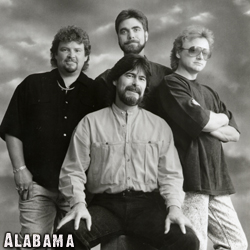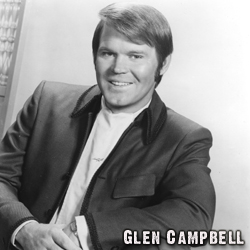Capitol Records, the label home of the Beach Boys, soon offered Campbell his own recording contract, and in 1967, he hit No. 18 on the Country charts with "Burning Bridges." Although promoted as a Country artist, Campbell quickly became a popular crossover artist. "Gentle on My Mind" hit the Top 40 of both the Country and pop charts; and "By the Time I Get to Phoenix" reached No. 2 on the Country chart and No. 26 on the pop chart. His successful singles continued with "I Wanna Live" and "Dreams of the Everyday Housewife."
CBS Television made Campbell a household name in 1968 when "The Glen Campbell Good-Time Hour" debuted on the air. For four years, Campbell hosted his successful television series, introducing musical talents such as John Hartford and Jerry Reed to the nation. During this time, Campbell remained a dominant force on the radio with "Wichita Lineman," "Galveston," "Try a Little Kindness" and other songs. He recorded duets with Bobbie Gentry, resulting in two hit remakes of the Everly Brothers classics "Let It Be Me" and "All I Have to Do is Dream." In 1969, he made his film debut in the John Wayne classic "True Grit." And in 1972, he hosted "The Sixth Annual CMA Awards," which was broadcast on CBS.
In 1975, Campbell topped both the Country and pop charts with the song that would become his signature tune, "Rhinestone Cowboy." He continued to have Top 10 success on the Country charts with singles including "Country Boy (You Got Your Feet in L.A.)" and "Don't Pull Your Love/Then You Can Tell Him Good-bye" before returning to the No. 1 spot on both the Country and pop charts with "Southern Nights" in 1977.
Throughout the '80s, Campbell remained a presence on Country radio with songs "Faithless Love," "A Lady Like You," "The Hand That Rocks The Cradle," "I Have You," "She's Gone, Gone, Gone" and many more. Moving into the '90s, Campbell recorded inspirational music and performed regularly at his Goodtime Theater in Branson, Mo. He published his autobiography, Rhinestone Cowboy, in 1994.
Throughout more than four decades, Campbell celebrated more than 75 songs on the Country charts; 35 of which crossed over to the pop charts. He received two CMA Awards in 1968, for Entertainer and Male Vocalist of the Year. He has received one Double Platinum, five Platinum and 12 Gold album certifications from the RIAA. He also received Gold single certifications for "Wichita Lineman," "Galveston," "Rhinestone Cowboy" and "Southern Nights."
the title cut. The band continued to release successful albums and singles throughout the '80s and '90s, producing 42 No. 1 singles. Additional hits include "Roll On," "If You're Gonna Play in Texas," "The Closer You Get," "Dixieland Delight," "Lady Down on Love," "Song of the South," "Forever's as Far as I'll Go," "I'm in a Hu rry," "Angels Among Us," "In Pictures" and many more.
Alabama was more than just a collection of great musicians. The four members of Alabama co-produced every album, showcasing their skills both in front of the microphone and behind the mixing board. Owen wrote several of the classic Alabama songs, including "Tennessee River," "Feels So Right," "Mountain Music" and "Lady Down on Love." Owen and Gentry co-wrote several hit songs, including "My Home's in Alabama," "Dancin', Shaggin' on the Boulevard" and others featured on Alabama albums.
Alabama created a new standard on tour, utilizing state-of-the-art production similar to what the top rock and pop acts of the day were using. Their music and high-energy stage shows brought Country Music to new, young audiences who enjoyed Lynyrd Skynyrd and Yes as much as Waylon Jennings and Dolly Parton.
Alabama's success paved the way for many other top Country Music groups including Diamond Rio, Dixie Chicks, Lonestar, Rascal Flatts and Restless Heart. With more than 65 million albums sold, Alabama is the best selling Country Music group of all time. They are among the Top 5 best-selling Country Music acts of all time and among the 20 best-selling recording acts of all time in the United States. The band has sold more albums in the United States than Boston, Chicago, Eric Clapton, The Doors, Bob Dylan, Foreigner and Journey, among others. Alabama has received nine CMA Awards including the first three consecutive wins as Entertainer of the Year (1982-1984); Album of the Year in 1983 for The Closer You Get; Vocal Group of the Year (1981-1983); and Instrumental Group of the Year (1981 and 1982). Throughout their career, they have received more than 150 industry awards and were named "Country Group of the Century" by the RIAA in 1999.
Alabama retired from the road after a sold-out 2003-2004 Farewell Tour. A career-spanning 25th Anniversary Box Set will be released in early 2006.
CMA Announces New Members of the Country Music Hall of Fame
By Scott Stem
The Country Music Association has announced that groundbreaking musical group Alabama, legendary singer/musician/television host Glen Campbell and pioneering Grand Ole Opry star DeFord Bailey will become the newest members of the coveted Country Music Hall of Fame. Formal induction for the artists will take place during "The 39th Annual CMA Awards," which will be broadcast live on the CBS Television Network, Tuesday, Nov. 15 (8:00-11:00 PM/EST) from Madison Square Garden in New York City.
Bailey will be inducted in the "Career Achieved National Prominence Prior to World War II" category, which is awarded every third year in a rotation with the "Recording and/or Touring Musician Active Prior to 1980" and "Non-Performer" categories. Campbell will be inducted in the "Career Achieved National Prominence Between World War II and 1975" category and Alabama will be the first artist inducted in the new "Career Achieved National Prominence Between 1975 and the Present" category created earlier this year.
All inductees are chosen by CMA's Hall of Fame panel of electors, consisting of more than 300 anonymous voters appointed by the CMA Board of Directors. Alabama, Bailey and Campbell and will increase the Hall of Fame membership from 92 to 95.
"A Country Music artist's highest aspiration is to be inducted into the Country Music Hall of Fame," said Ed Benson, CMA Executive Director. "The late DeFord Bailey was a star of the Grand Ole Opry during the Great Depression, lifting America's spirits with his harmonica. Glen Campbell brought Country Music to millions of fans in the late '60s and '70s with his numerous classic crossover hits as well as his successful television variety series. Alabama brought a new energy and a broader audience to Country Music in the '80s, becoming the most successful band in our format's history. CMA is proud to induct all three artists into the Country Music Hall of Fame where they will join an elite group of performers and industry veterans who have significantly shaped Country Music over the last century."


August 30, 2005
© (l-r back row):Jeff Cook; Teddy Gentry; Mark Herndon and Randy Owen. Photography courtesy of Country Music Hall of Fame and Museum

© courtesy of Country Music Hall of Fame and Museum

courtesy of Country Music Hall of Fame and Museum
ALABAMA
Formed in Fort Payne, Ala., cousins Randy Owen (lead vocals, rhythm guitar), Teddy Gentry (bass guitar, harmony vocals) and Jeff Cook (lead guitar, keyboards, fiddle, harmony vocals) teamed in the late '60s to form several bands including Young Country and Wildcountry. The trio, along with a number of different drummers, honed their skills in nightclubs across the Southeast. Changing their name to Alabama in 1977 and adding drummer Mark Herndon in 1979, the band solidified their lineup and soon signed with RCA Records, where they have remained throughout their amazing career.
Alabama met immediate success with radio and the fans. Their first RCA album, My Home's in Alabama, was released in May 1980, featured the hit title cut, "Tennessee River" and "Why Lady Why," and was certified Double Platinum by the RIAA for more than 2 million units sold. Their sophomore album, Feels So Right, was certified Quadruple Platinum for more than 4 million units sold and contained the hits "Old Flame," "Love in the First Degree" and the title cut. Mountain Music, the band's third album, was certified Quintuple Platinum for more than 5 million units sold and produced the hits "Take Me Down," "Close Enough To Perfect" and
GLEN CAMPBELL
Born in Delight, Ark. in 1936, Glen Campbell received his first guitar when he was 4-years-old. While studying the recordings of jazz guitarists Barney Kessel and Django Reinhardt, Campbell learned to sing at church. At 14, he began performing in Country Music bands across Arkansas, New Mexico and Texas; at 18, his band, the Western Wranglers, toured the South; and at 22, he moved to Los Angeles to become a session musician.
During the early '60s, Campbell played guitar on records for The Association, Bobby Darin, Merle Haggard, Dean Martin, The Mamas and the Papas, The Monkees, Ricky Nelson, Elvis Presley, Frank Sinatra and many others. He released a couple of pop singles on the Crest and Capitol Records labels with limited success. He also sang and played guitar on "Kentucky Means Paradise" by the Green River Boys, which became a Top 20 Country hit in 1962. In 1965, Campbell became a touring member of the Beach Boys for several months after Brian Wilson retired from the road.
DEFORD BAILEY
DeFord Bailey was born in Smith County, Tenn. in 1899. Bailey suffered from infantile paralysis, which left him with a deformed back and only allowed him to grow to the height of 4 feet 10 inches. Bailey's father and uncle were noted musicians who played what they referred to as "black hillbilly music." They taught young Bailey to play banjo, fiddle, guitar and, what would become his signature instrument, harmonica.
Bailey began playing harmonica professionally around Smith County at age 14, and moved to Nashville in 1925. Around this time he met Dr. Humphrey Bate, a respected physician and harmonica player who introduced Bailey to George D. Hay. Hay, who was known as "The Solemn Old Judge," was both announcer and booking agent for the WSM Barn Dance. Bate's support was instrumental in Bailey being accepted as the first African American artist to join the national radio show. In 1927, the WSM Barn Dance was renamed the Grand Ole Opry with Bailey becoming one of the radio show's first solo stars. He performed on 49 of the 52
Opry programs during its first year under the new name, more than any other artist.
Bailey recorded albums in the late '20s on labels including Brunswick, Columbia and Victor. His recordings are critically viewed as the first decently recorded examples of harmonica playing. His best-known songs were "John Henry," "Fox Chase," "Muscle Shoals Blues" and his signature tune "Pan American Blues." His success helped create opportunities for other harmonica players to record and perform across the country. In addition to recording and performing on the Opry, Bailey often worked road shows with other Opry acts during the '30s, including opening for Roy Acuff and as a package tour with Uncle Dave Macon.
Bailey left the music industry in 1941. He returned to the Grand Ole Opry stage in 1974 to inaugurate the First Annual Old Timers Show. In 1982, he passed away at 83. Bailey's pioneering efforts have been an inspiration to many, including fellow Country Music Hall of Fame member Charley Pride.
Jimmie Rodgers and Hank Williams were among the first to be chosen for the Country Music Hall of Fame in 1961. Since then, a virtual "who's who" of Country Music's finest have been inducted. They include Roy Acuff (1962), Eddy Arnold (1966), Gene Autry (1969), Patsy Cline (1973), Minnie Pearl (1975), Johnny Cash (1980), Merle Haggard (1994), Brenda Lee (1997), Elvis Presley (1988), Dolly Parton (1999) and Kris Kristofferson (2004).
A complete list of Country Music Hall of Fame members is available at www.CMAawards.com or www.countrymusichalloffame.com.
© 2004 CMA Close Up News Service